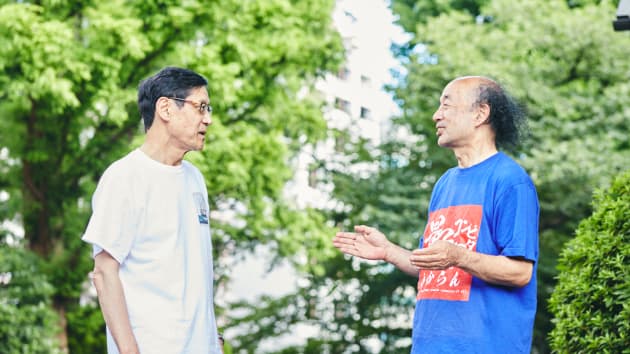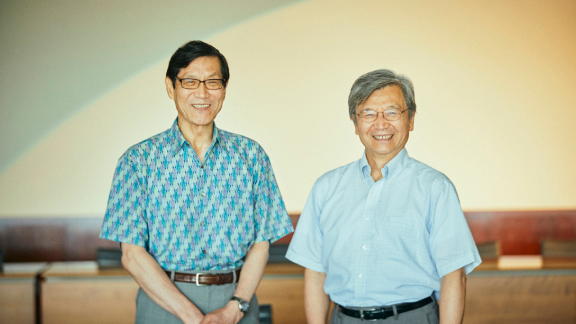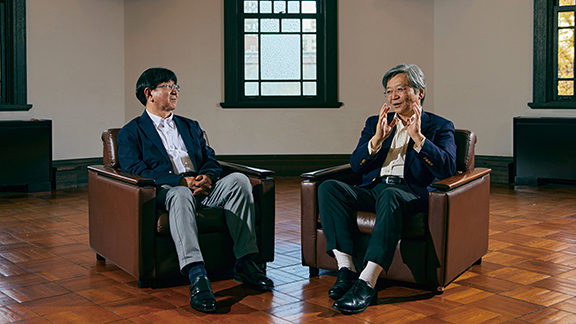Dialogue series Vol. 1
New Challenges for the Next 10 Years
In 2024, Meiji Gakuin University is planning to establish its first science department, the School of Information and Mathematical Sciences. Two key figures deeply involved in the plan, President Reinan Murata and TUAT Professor Emeritus Takashi Hiraki, a former friend of the President and special assistant to the President, spoke about their passion for the new faculty, looking at the current situation in Japan and the world, the rapidly changing information society and its future.
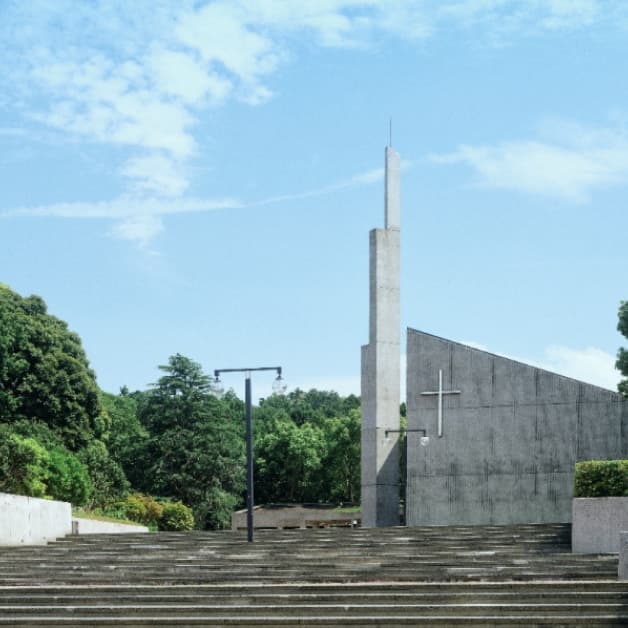
Professor Emeritus, Tokyo University / Special Supplementary Professor, Meiji Gakuin University
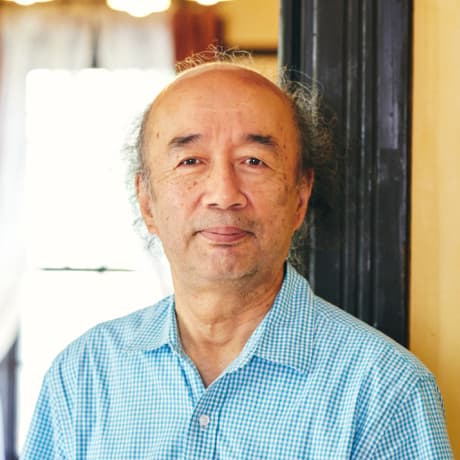
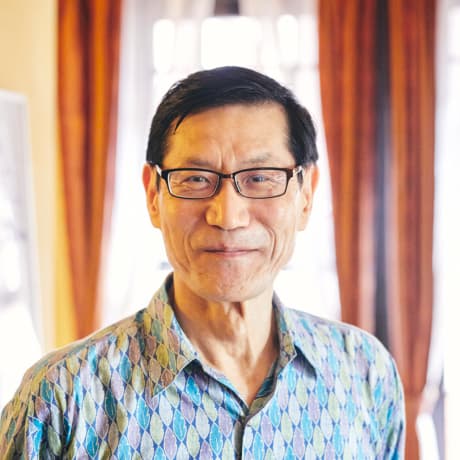
Student days sharing the possibilities of the information sector.
First of all, please tell us how you two met.
When I entered TUAT Science I in 1971, I was placed in Class 1, a class of only 11 students, and my classmate was Mr. Murda. As I was French and he was German, we only had separate classes for bi-lingual languages, but for almost all other subjects, including experiments, we took almost all classes together. The small size of the class made it even closer and we spent a lot of time together outside of class.
Class "1" consisted of 8 students who had already studied German and 3 students who had already studied French. Because this number of students was not sufficient for a language class, the bi-lingual classes were not only for Science I students, but also for a mixture of students from Social Sciences to Science III. I still think it was great to be in classes with people from the social sciences, whose personalities were different from ours in the sciences.
What has been the relationship between the two of you since then?
I went to the Department of Mathematics and Mr Hirai went to the Department of Physics, but we often went back and forth because we lived in the same building in the Faculty of Science. One time, I was trying to find out whether a certain condition was valid for as many prime numbers as possible, but if I tried to do it by calculation, I could only calculate about 90 of them, even if I spent a whole night. So I asked Professor Hirai if I could somehow use his calculator.
This was before the start of information processing education, but he had been involved in information processing at the Physics Department since then. Then he said, 'Well, bring me a flowchart of your steps and I'll take care of the rest'. Then he ran the university's calculator, and in ten minutes he was able to calculate about 87,000 prime numbers. I remember well seeing these amazing results and being convinced that times were going to change.
Friendships and memories were formed during the graduation journey, including an 8-day/7-night walking tour around Shikoku for the three 'class 1' students, including Mr Hirai. Both students went on to study in the programme, and although their paths diverged into mathematics and information processing, their relationship of trust has endured.
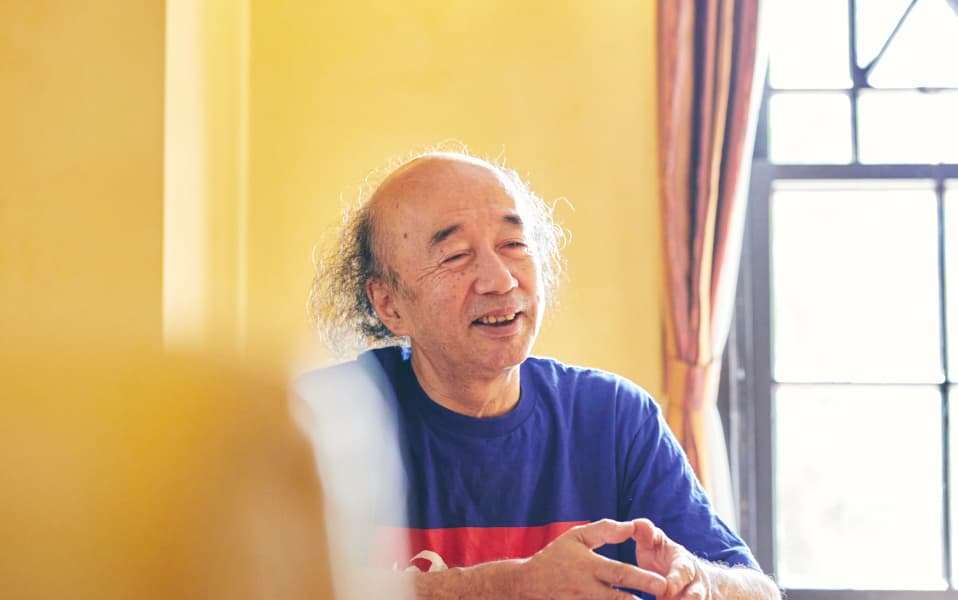
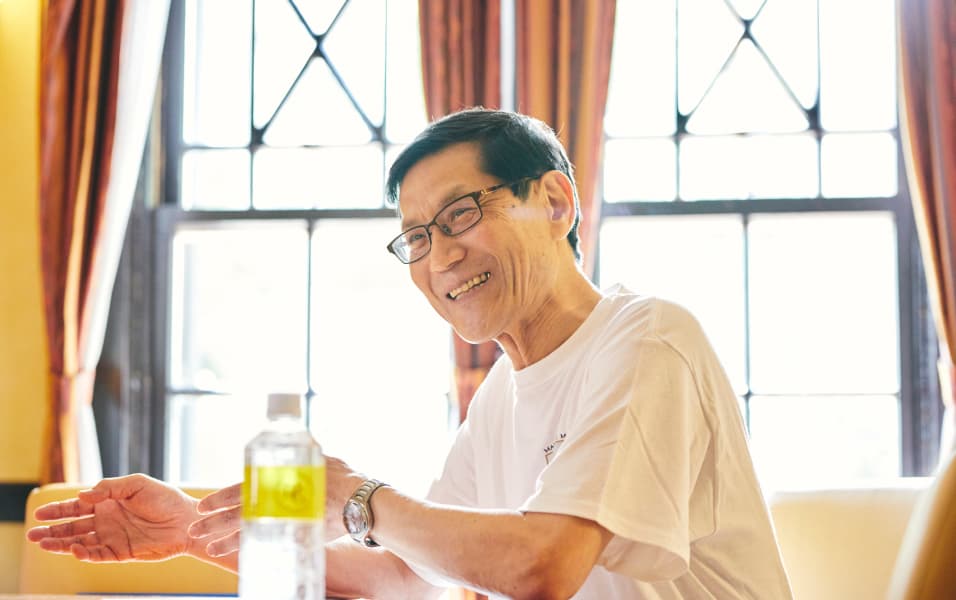
The evolution of computers (information processing) will change society and the way people live.
Have you always been involved in information processing?
I entered the world of information when I created an interface to handle computer input/output in my laboratory. I have been in the information field ever since. However, I was naved in the Physics Department, and it was three years after I graduated that the Department of Information Science, which specialises in information, was established at the University of Tokyo, so I am known as a minus-third student (laughs).
The first phase of information processing education in Japan was when the Department of Information Science was established and was mainly intended to train people to produce software for the large computers that were beginning to enter the market in large companies and universities. The trigger was the advent of the internet, and in particular web systems. The need for education linking human society and the world of information has increased, as not only specialists in programming, but also ordinary office workers, have started to create and use web applications.
The third phase came around the mid-2000s. The third period came around the mid-2000s, when smartphones appeared on the scene and everyone was able to create content, making it necessary to train specialists in the creation of information systems. The number of people who have been trained in the field of information systems has been increasing since the mid-2000s, and the number of people who have been trained in the field of information systems has also been increasing.
So the information processing sector has developed rapidly.
The driving force behind this is computing 'speed': in the 1960s, early computers had a computing speed of 1 MFLOPS (10 to the sixth power of one second); today it is 1 EFLOPS (10 to the 18th power), which means a trillion times faster in 60 years. Today, the momentum of this speed increase has not changed, and network speeds are similarly increasing.
If this continues, by 2030-2040 there will almost certainly be computers with 1ZFLOPS (21st power of 10), which will be 1000 times faster. It is said that they will be capable of processing information almost as fast as humans. In order to keep up with these computers, everyone must understand computers. Not everyone needs to be a pro-computer specialist, but they must have basic knowledge. When Mr. Murata consulted me about the idea of a new faculty, I informed him of the current situation in the information world and the background required for information education.

It was a long-held dream to create a science department at Meiji Gakuin University.
Where did the idea of creating a Faculty of Information and Mathematical Sciences come from in the first place?
理The idea of creating a department of systems was not suddenly conceived. It has been discussed many times at the University in the past, but such talk came and went. Mathematics underpins the sciences, and experience has shown since ancient Greek times that mathematics is the best way to train logical ways of thinking. Therefore, my own naves have always felt the need for a science organisation with a proper mathematical basis within the university.
However, there is a wide range of science fields. If Meiji Gakuin University, which has no foundation in science, were to create a new university, it would be impractical to do so in an area that requires a great deal of accumulated research or that requires tremendous facilities and equipment.If Meiji Gakuin University, which upholds "Do for Others" as its educational philosophy, is to create a science department, it must be a department that contributes to society and people - I related this to the current social situation and thought that if we were to create a university, it would have to be in the information field. I decided to visit Mr Hirai and ask him about his experiences. This was about eight years ago. But even then, the environment was not conducive and I lost my way.
In the 2019 presidential election, I wrote in my manifesto that I wanted to create a science department within Meiji Gakuin University, and I was planning to move towards the establishment of a new faculty. However, we were hit by the Corona disaster shortly after I was appointed president, and the urgent need to deal with this forced us to put the idea of a faculty on the back burner. About six months later, when things had settled down on campus, I visited Mr Hiraki's house again.
So it is finally starting to move.
September 29, 2020. We were able to hear to the best of our ability about the history of information education as described by Mr Hirai, the future direction of the world of information and what would be effective in creating an information faculty nowadays. What was strongly suggested in his talk was that the future of information will be an era in which links with human society and the accumulation of social and cultural studies are not being used as a foundation. As our university has an accumulation of cultural studies, if we can establish a new faculty of information science and organically link it with the existing faculty of culture, we will be able to train the kind of people who will be active after 2030, as Professor Hirai said, and the creation of such an information science faculty will surely support the future development of Meiji Gakuin. I am now strongly convinced that the creation of such an information faculty must support the future development of Meiji Gakuin.
So we immediately arranged an opportunity for Mr Hirai to give the same talk on campus. In January 2022, after a decision by the Union Faculty Council, the Faculty of Information and Mathematical Sciences was officially ready to start its activities.
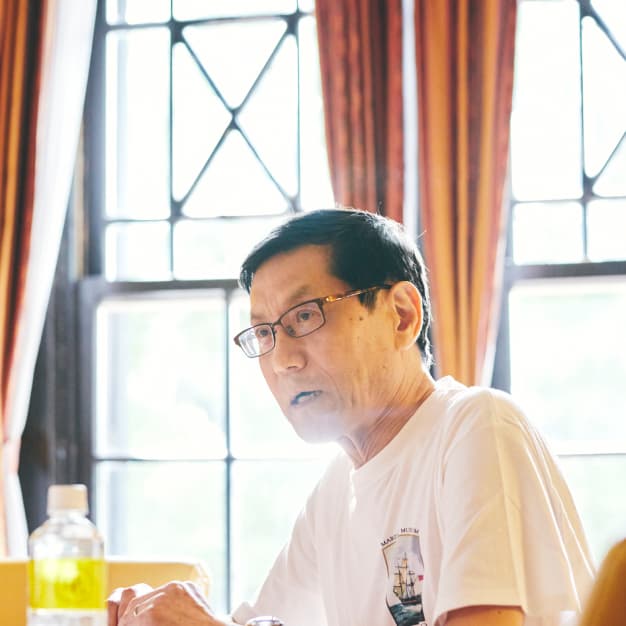
No longer can anyone say that 'mathematics is not relevant' today.
Why did it take the form of a faculty?
The current university divide is roughly divided into social sciences and sciences, but I believe this is merely a matter of whether or not students have studied mathematics at secondary school. It is unreasonable to divide the social and scientific world on the basis of whether or not students have studied Mathematics III, especially differential and integral calculus. Nowadays, the concepts of derivatives and integrals are an education that everyone needs to know, especially as they are essential knowledge for understanding AI and deep learning. The difference between science and culture is whether the subject of study is nature or human intellectual activity, but as computers become capable of human-like thinking, the study of information will become increasingly important in culture, where human intellectual activity is the subject. Then you have to study the mathematics on which computers are based. If this is the case, we need a faculty where mathematics can be studied thoroughly, and I suggested to Mr. Murata that it would be better to create a new faculty of this kind.
The University has departments that deal with information, so it is possible to create an information organisation by extending these departments and then establishing an independent organisation. However, according to Mr Hiraki's experience, it would be difficult to succeed.
I have created various organisations at Tōdai so far, and the difficulty of creating a fusion-type organisation is very deep in my nose. This is because as fusion research is carried out, it is eventually absorbed by the original organisation. If you want to fuse, the secret to continuing fusion research on a permanent basis is to create a new, flexible organisation and carry out fusion education and research, while leaving the non-fusion organisation in place.
Following this advice, we decided to create a completely new faculty, separate from the existing faculties. First of all, we wanted to make sure that the new faculty would be able to survive on its own, and then build a bridge between it and the existing faculties, so that the university's social and cultural heritage and scientific thinking and methods would mix well, allowing what Mr Hirama calls "permanent fusion research". We decided to establish the 'Center for Interdisciplinary Informatics' as a bridge for interdisciplinary research and to start it at the same time as the Faculty of Information Mathematics and Science.
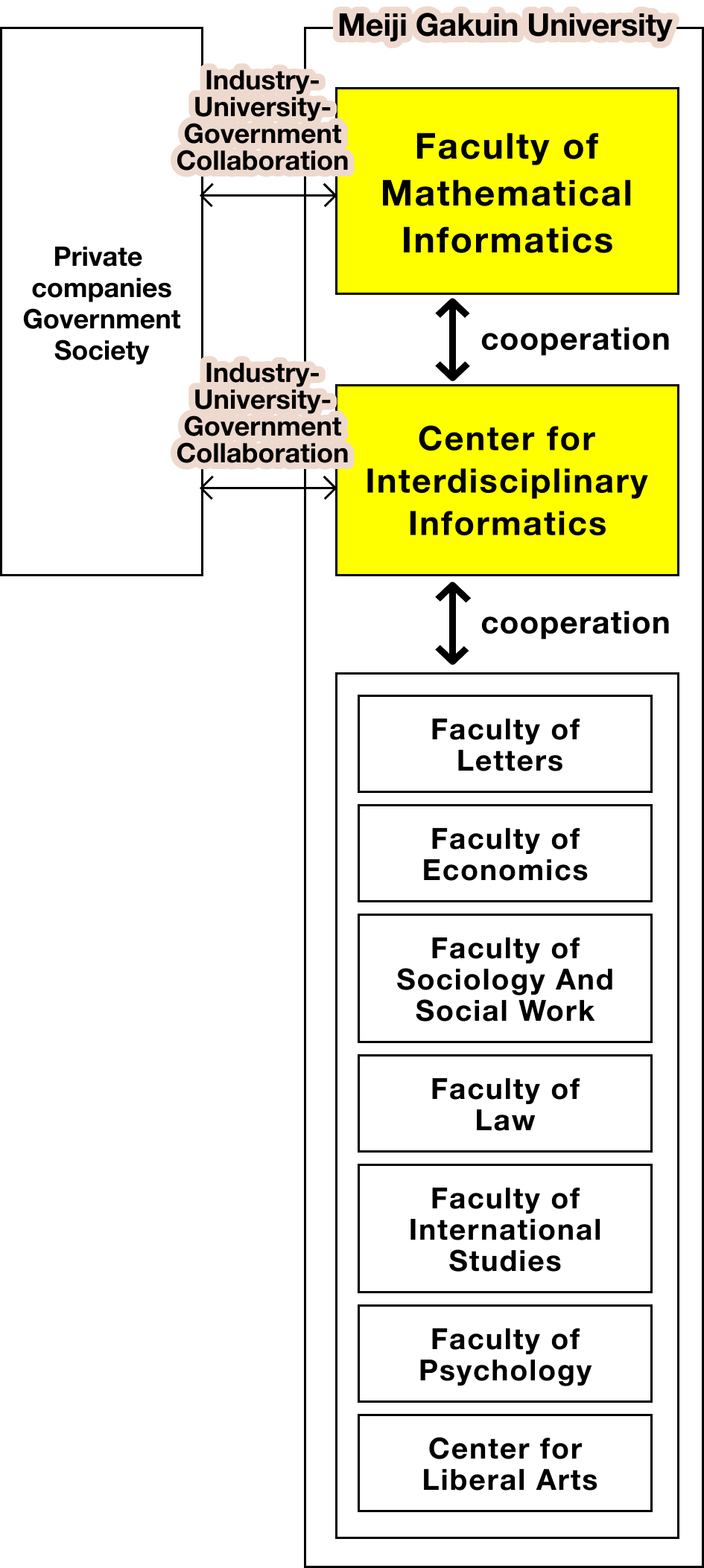
List of articles in dialogue
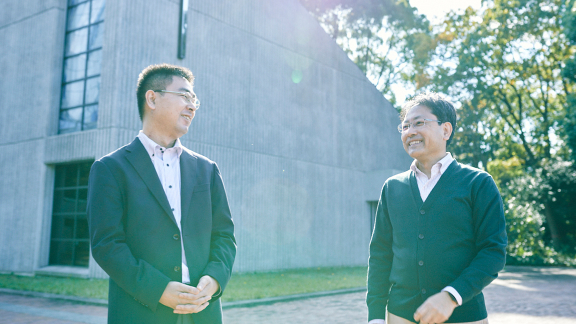 Mr. Irie (Denso) ・ Prof. Ota ed.
Mr. Irie (Denso) ・ Prof. Ota ed. Dialogue Series Vol.2 A future is coming that not even Einstein could have imagined. ― The world of "information" changed by quantum mechanics. From there, the Faculty of Information and Mathematical Sciences learns from a future perspective.
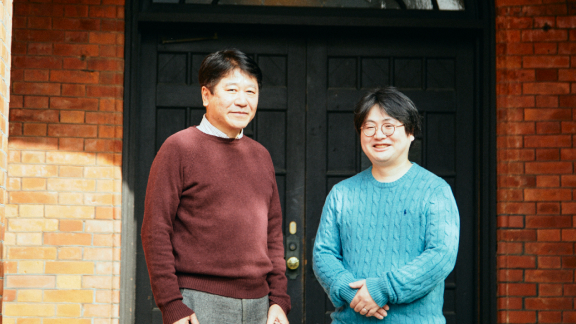 Prof. Kameda and Associate Prof. Inukai, eds.
Prof. Kameda and Associate Prof. Inukai, eds. Dialogue Series Vol.3 Updating the humanities and social sciences with the power of information mathematics! ― Information mathematics is a communication and hub that connects disciplines and people.
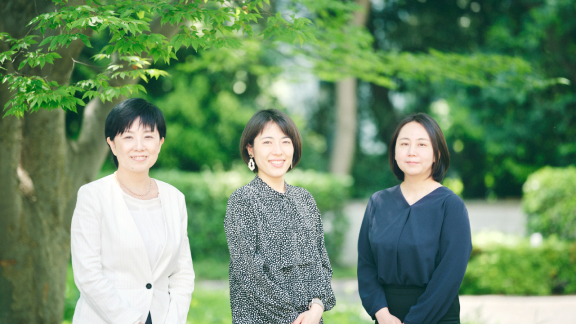 Female Researchers Edition
Female Researchers Edition Dialogue Series Vol.4 A background in informatics and mathematics is the foundation of all science. ― Great Expectations for Integration with Diverse Fields

